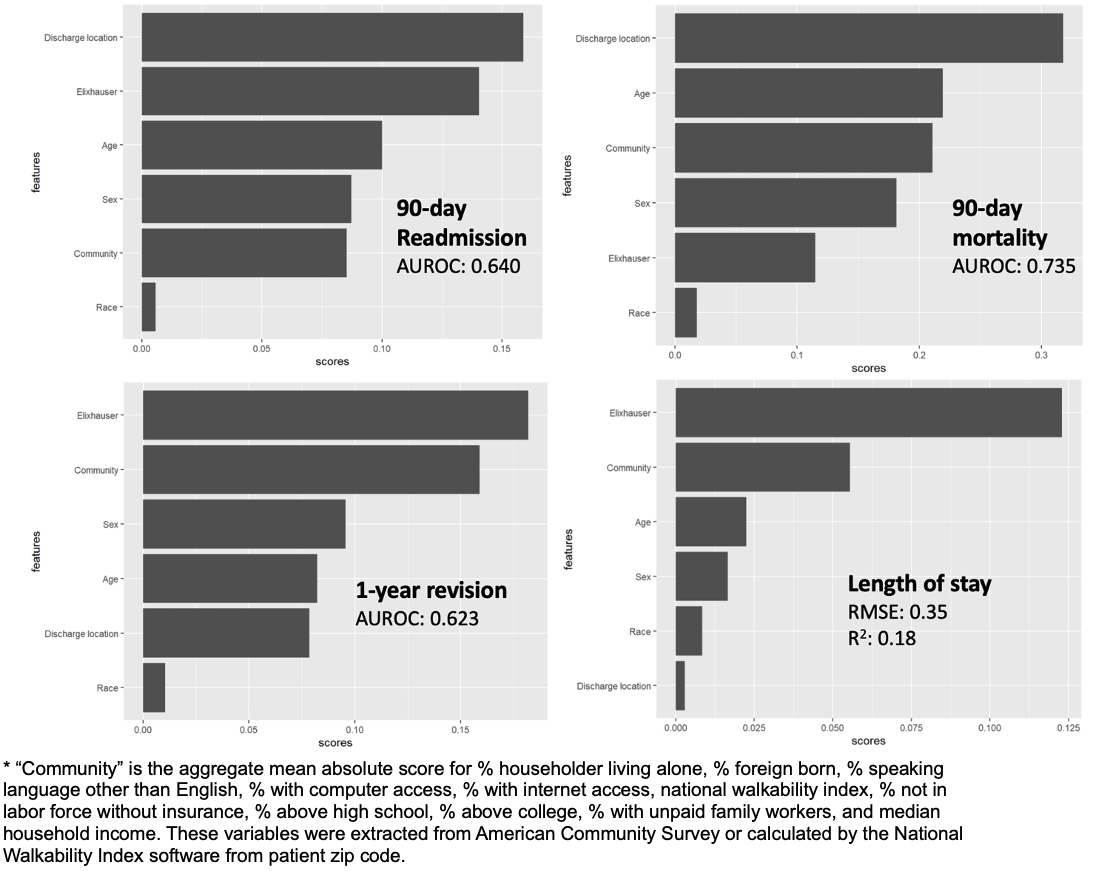Session Information
Date: Sunday, October 26, 2025
Title: Abstracts: Orthopedics, Low Back Pain, & Rehabilitation (0783–0788)
Session Type: Abstract Session
Session Time: 1:30PM-1:45PM
Background/Purpose: Despite changing trends and increased utilization of total knee arthroplasty (TKA) in the United States,1 there are still prominent racial and ethnic disparities in utilization and outcomes. This highlights the importance of exploring the social determinants of health (SDOH) that may play a role in disparities in TKA outcomes, especially as postoperative complications are of paramount concern in patient and provider consideration of TKA. We aimed to utilize prediction modeling to elucidate the relationship between adverse total knee arthroplasty outcomes – including 90-day readmission, 90-day mortality, 1-year revision, and length of stay (LOS) – and multiple community-level SDOH.
Methods: Patients who underwent TKA between 2012-2018 were identified from the Pennsylvania Health Care Cost Containment Council Database by ICD codes. Census-tract level community factors were extracted from the US census via geocoding. These SDOH variables included internet access, percent of unpaid family worker, with computer access, percent with no computer access, percent of having high school and above education, percent of having college and above education, national walking index, median income, living alone, total foreign born and percent of speak other language than English. This retrospective cohort study used explainable boosting machine (EBM), a modern form of generalized additive model (GAM), to predict 90-day readmission, 90-day mortality, and 1-year revision, and LOS. Area under the receiver operating curve (AUROC) and root mean squared error (RMSE) were used as evaluation metrics. Models were trained and tested using random train and test split and cross validation techniques to reduce overfitting and ensure robustness.
Results: We identified 215,414 patients undergoing TKA between 2012-2018 (Table 1). Model predictive performance was highest for mortality (AUROC=0.74), and was moderate for readmission (AUROC=0.64), revision (AUROC=0.62), and LOS (RMSE=0.35, R2=0.2) (Figure 1). Community factors were among the top five predictors of mortality, revision, and LOS.For readmission, the top 3 predictors were discharge location, comorbidities, and age (mean absolute scores = 0.16, 0.14, 0.10, respectively). For mortality, they were discharge location, community factors, and age (mean absolute scores = 0.31, 0.21, 0.21, respectively). The top 3 predictors of revision were comorbidities, community factors, gender (mean absolute scores = 0.18, 0.16, 0.09, respectively). Lastly, the top predictors for LOS were comorbidities, community factors, and age (mean absolute scores = 0.12, 0.05, 0.02, respectively).
Conclusion: In the prediction of 90-day readmission, 90-day mortality, 1-year revision, and LOS after TKA, community factors were more important than race in each of our examined models. This study provides additional nuance to the racial disparities within TKA outcomes and may suggest that community-level factors should also be considered and addressed to improve adverse TKA outcomes. Ravi B et al. The changing demographics of total joint arthroplasty recipients in the United States and Ontario from 2001 to 2007. PMID:23218428
 Table 1. Patient-level characteristics by outcome
Table 1. Patient-level characteristics by outcome
.jpg) Figure 1. Variable importance plots in the prediction of total knee arthroplasty outcomes*
Figure 1. Variable importance plots in the prediction of total knee arthroplasty outcomes*
To cite this abstract in AMA style:
Heiting C, Wu Y, Goodman S, Sculco P, Wang F, Caruana R, Cram P, Ibrahim S, Mehta B. It Takes a Community: Exploring the Importance of Community-Level Social Determinants of Health in Total Knee Arthroplasty Outcomes [abstract]. Arthritis Rheumatol. 2025; 77 (suppl 9). https://acrabstracts.org/abstract/it-takes-a-community-exploring-the-importance-of-community-level-social-determinants-of-health-in-total-knee-arthroplasty-outcomes/. Accessed .« Back to ACR Convergence 2025
ACR Meeting Abstracts - https://acrabstracts.org/abstract/it-takes-a-community-exploring-the-importance-of-community-level-social-determinants-of-health-in-total-knee-arthroplasty-outcomes/
